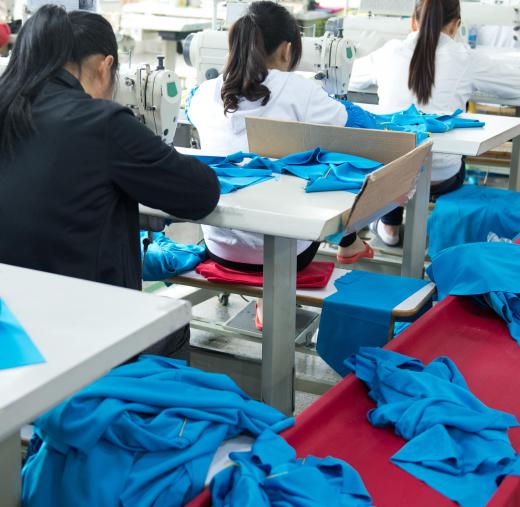A clothing factory is a facility designed to produce mass quantities of apparel. At most clothing factories, there are designated areas where various designs of clothing are produced, and garments will be organized according to color, design, and size. Various phases of garment production will take place to create custom-made garments and ready-to-wear styles. The use of computers, technical equipment, and machines will help factory workers complete their tasks. A management office will be designated to plan logistic strategies.
The production of clothing is not the only activity at a clothing factory. Most clothing factories have an office where administrative work can be accomplished. Factory managers generally have strategies for efficient operation, typically referred to as systematization. Managers and supervisors often oversee factory workers to ensure they are competing tasks in a timely and efficient manner. Management may also use a checklist to ensure proper materials are on hand and ready for production.

Clothing designers may work to create fashions inside a clothing factory. Designers often work in a special room or office, or a designated closed area inside the factory. Here, they create blueprints and designs with computer graphic programs or freehand sketching. They may also work with the technical crew to understand how the equipment is being used to produce the clothing.

Typically, factory workers begin their task with a set of clothing designs. The first step in the production process will take place inside a sewing room. Often, the clothing factory workers will create swatches or samples of a garment. Garment samples created from the designer's specifications may be presented to clients for their approval. If requested by clients, workers may perform modifications.

A garment finishing procedure known as wet processing may also take place at a clothing factory. A special color-dying process will enhance the fabric's appearance and texture, and is often necessary to preserve the life of the garment. Popular garment finishes include wrinkle-free and fire-retardant solutions. Seam engineering is another vital job in clothing factory manufacturing.

Quality control management will typically inspect the work that has been completed at a clothing factory. These workers are often referred to as quality assurance inspectors and they perform a stringent series of tests to be sure the garments meet production standards. Quality control may visit several garment factories within a district or be limited to one clothing factory.
